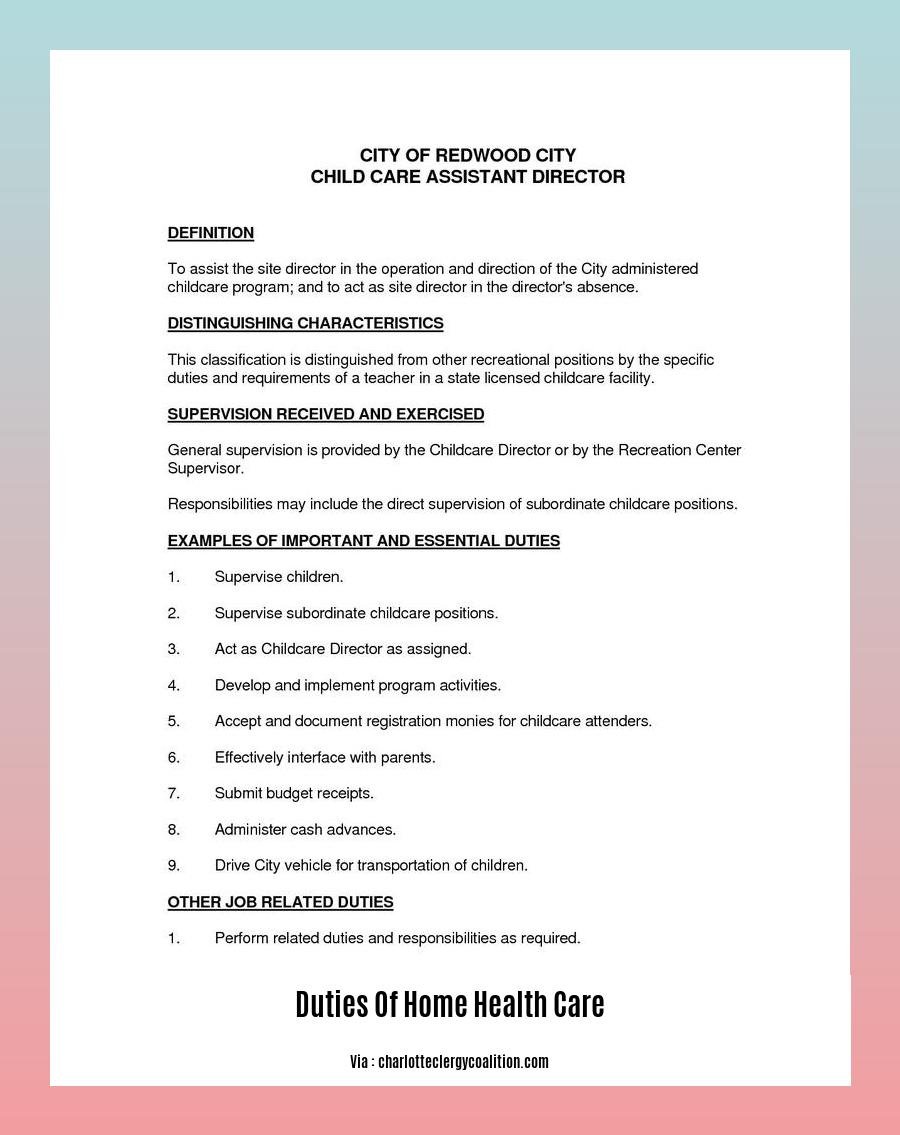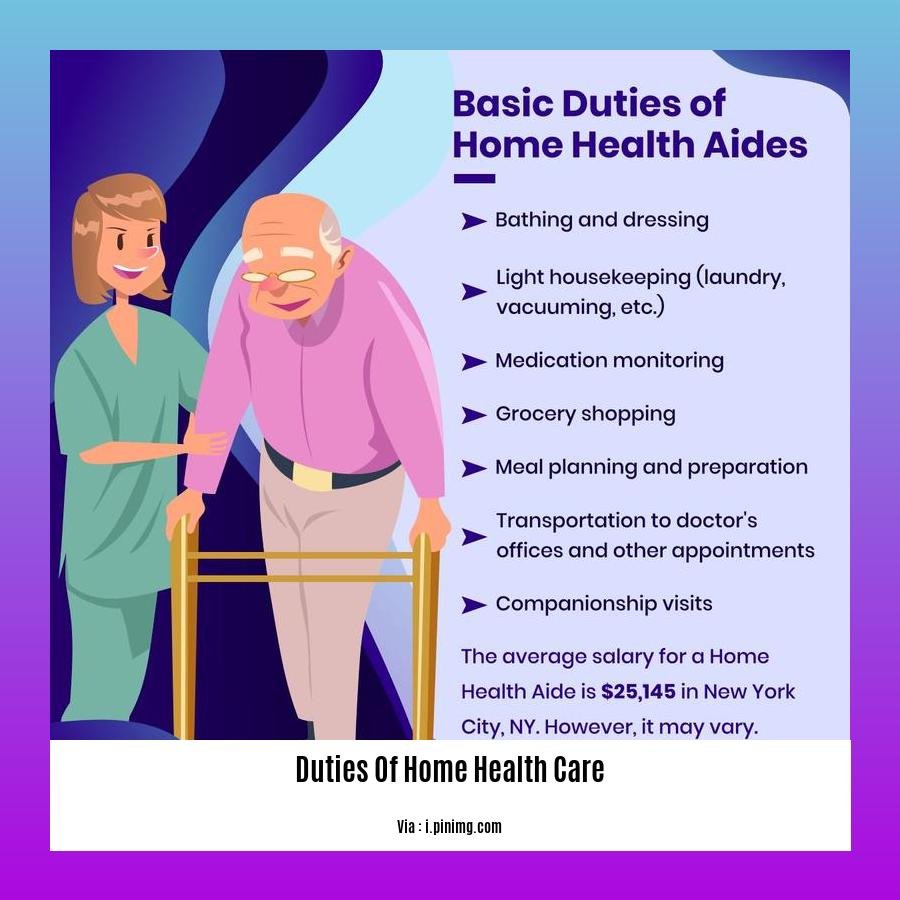Delve into the intricate world of home health care in our comprehensive guide, [The Duties of Home Health Care: A Comprehensive Guide to Providing Quality Care]. Discover the multifaceted roles of home health and personal care aides, encompassing both Medicare and non-Medicare duties. Explore the essential services they provide, ranging from medication management and wound care to assisting with daily activities and offering emotional support. Gain insights into the collaborative nature of home health care, highlighting the importance of interdisciplinary teams and effective communication with patients and families. Stay abreast of the latest advancements in home health care practices and learn how these dedicated professionals strive to uphold the dignity and independence of those in need, allowing them to flourish in the comfort of their own homes.
Key Takeaways:
-
Home health aides provide personal care services, administer medication, monitor vital signs, and assist with household tasks to patients in their homes.
-
Home health aides must have proven working experience, be able to monitor vital signs and collect specimens, and have knowledge of basic nutrition and personal hygiene standards.
-
Home health aides must possess strong communication and interpersonal skills, be able to work independently and as part of a team, and have a compassionate and patient demeanor.
-
Home health aides play a crucial role in providing quality care to patients in their homes, enabling them to maintain their independence and dignity while receiving the necessary medical attention.
Duties of Home Health Care

Home health care is a valuable service that provides personalized medical and non-medical care to individuals in the comfort of their homes. The primary duties of home health care encompass a wide range of responsibilities aimed at promoting the well-being and independence of patients. These duties are performed by a team of skilled professionals, including registered nurses, licensed practical nurses, certified nursing assistants, and home health aides, who work collaboratively to address the unique needs of each patient.
H3. Essential Duties and Responsibilities
- Assessment and Care Planning:
- Conducting comprehensive assessments to understand the patient’s medical condition, functional abilities, and psychosocial needs.
- Developing individualized care plans in collaboration with the patient, family, and healthcare team.
-
Regularly reviewing and updating care plans based on the patient’s changing condition and progress.
-
Medication Management:
- Administering medications as prescribed by the healthcare provider.
- Monitoring medication adherence and effectiveness.
-
Educating patients and families about medication management.
-
Personal Care and Assistance:
- Assisting with activities of daily living, such as bathing, dressing, grooming, and toileting.
- Providing personal care services to maintain hygiene and prevent skin breakdown.
-
Assisting with mobility and transferring patients safely.
-
Wound Care and Treatment:
- Assessing and monitoring wounds for signs of infection or deterioration.
- Providing wound care as prescribed by the healthcare provider.
-
Educating patients and families on proper wound care techniques.
-
Nutritional Support:
- Assessing nutritional needs and recommending appropriate dietary modifications.
- Preparing and assisting with meals that meet the patient’s dietary requirements.
-
Monitoring food and fluid intake to ensure adequate nutrition and hydration.
-
Emotional and Social Support:
- Providing emotional support and companionship to patients and their families.
- Encouraging social interaction and engagement with the community.
-
Advocating for the patient’s rights and needs.
-
Communication and Collaboration:
- Maintaining open communication with patients, families, and other healthcare professionals.
- Collaborating with the healthcare team to ensure a coordinated approach to care.
- Providing regular updates on the patient’s condition and progress to the healthcare provider.
H3. Additional Duties
In addition to the core duties mentioned above, home health care providers may also perform the following tasks:
- Assisting with household tasks, such as light cleaning, laundry, and meal preparation.
- Accompanying patients to medical appointments and errands.
- Providing respite care to caregivers.
- Educating patients and families on disease management and self-care strategies.
- Conducting fall risk assessments and implementing preventive measures.
-
When thinking about designing your home’s name board, head over to home name board design for unique and creative ideas.
-
Wondering about meaningful and auspicious home name ideas? Check out home name ideas in Gujarati for inspiration.
-
Explore various home name ideas rooted in Indian culture and traditions for a touch of heritage.
-
For a comprehensive list of auspicious and meaningful home names, browse through the extensive collection at home name in India.
Medicare Home Health Aide Duties

When it comes to providing Medicare Home Health Aide Duties, it’s all about offering a helping hand and ensuring the well-being of individuals in the comfort of their own homes. As a home health aide, you’ll play a vital role in improving the quality of life for those in need. Let’s delve into the diverse responsibilities that Medicare home health aides fulfill.
Key Takeaways:
-
Medicare covers Medicare Home Health Aide Duties when skilled nursing care or rehabilitation services are provided too.
-
Medicare Home Health Aide Duties include personal hygiene assistance, basic healthcare services, light housekeeping, and transportation arrangements.
-
Home health aides collaborate with patients, families, and healthcare providers to create personalized care plans.
-
Home health aides must possess compassion, patience, and strong communication skills to provide effective care.
-
Medicare does not cover Medicare Home Health Aide Duties as a standalone service.
Providing Personal Care and Assistance:
-
Assist with activities of daily living such as bathing, dressing, grooming, and toileting.
-
Help patients maintain personal hygiene and ensure their comfort and safety.
-
Monitor patients’ vital signs and report any changes to the healthcare provider.
Healthcare Services and Treatment Administration:
-
Administer medication and treatments as prescribed by a healthcare professional.
-
Educate patients about their medications and treatment plans.
-
Monitor patients’ responses to treatments and report any adverse reactions.
Household Tasks and Errands:
-
Assist with light housekeeping tasks such as laundry, meal preparation, and general cleaning.
-
Help patients with grocery shopping, errands, and transportation arrangements.
-
Ensure a safe and comfortable living environment for patients.
Collaboration and Communication:
-
Collaborate with patients, families, and healthcare providers to create personalized care plans.
-
Communicate effectively with patients, families, and healthcare providers to ensure the best possible care.
-
Maintain accurate and detailed records of patient care and progress.
Compassion and Professionalism:
-
Demonstrate compassion, patience, and empathy when caring for patients.
-
Respect patients’ privacy and confidentiality.
-
Maintain a professional and ethical demeanor at all times.
Conclusion:
As a Medicare Home Health Aide, you’ll make a profound difference in the lives of individuals in need. Your dedication, compassion, and unwavering support will help patients maintain their independence and dignity while receiving the care they require. Embrace this noble profession and embark on a journey of making a positive impact on people’s lives.
Sources:
[1] https://www.medicare.gov/Pubs/pdf/10969-Medicare-and-Home-Health-Care.pdf
[2]
Duties of Home Health Care Provider
Navigating the realm of home health care can be daunting, but understanding the duties of a home health care provider can illuminate the path to compassionate and comprehensive care. As a seasoned home health care provider, I’m here to unveil the intricacies of this noble profession, empowering you to make informed decisions about your well-being or that of your loved ones.
Key Takeaways:
-
Home health care providers offer a range of services, including personal care, medication management, wound care, and emotional support, to individuals in their homes.
-
Duties encompass assessing patients’ needs, creating personalized care plans, and collaborating with interdisciplinary teams to ensure the highest level of care.
-
Home health care providers play a crucial role in maintaining patients’ dignity, independence, and overall well-being within the comfort of their own homes.
-
Effective communication, empathy, and a commitment to patient-centered care are essential qualities for successful home health care providers.
Duties of Home Health Care Provider: A Comprehensive Overview
-
Assessment and Care Plan Development:
-
Evaluating patients’ physical, emotional, and cognitive needs through comprehensive assessments.
-
Developing individualized care plans in collaboration with patients, families, and interdisciplinary teams, ensuring a holistic approach to care.
-
Personal Care and Assistance:
-
Providing assistance with activities of daily living (ADLs), such as bathing, dressing, and toileting, promoting independence and dignity.
-
Monitoring vital signs and general health status to detect changes and ensure prompt intervention.
-
Medication Management:
-
Administering medications as prescribed by healthcare professionals, ensuring accurate dosage and timing.
-
Monitoring medication adherence and educating patients about their medications and potential side effects.
-
Wound Care and Treatment:
-
Providing wound care services, including dressing changes, wound monitoring, and infection prevention.
-
Collaborating with healthcare professionals to manage complex wounds and ensure optimal healing outcomes.
-
Emotional Support and Advocacy:
-
Offering emotional support and companionship to patients and their families, alleviating isolation and promoting well-being.
-
Advocating for patients’ rights and ensuring their needs are met, collaborating with healthcare teams to provide the best possible care.
-
Collaboration and Communication:
-
Communicating effectively with patients, families, and interdisciplinary teams, ensuring a coordinated approach to care.
-
Maintaining accurate and detailed records of patient care, including assessments, interventions, and progress.
-
Continuous Education and Professional Development:
-
Keeping abreast of the latest advancements in home health care practices through ongoing education and training.
- Participating in professional development opportunities to enhance skills and knowledge, delivering the highest quality of care.
Sources:
Home Health Aide Responsibilities Include
What Does a Home Health Aide Do? With Duties and Description
FAQ
Q1: What are the primary responsibilities of a home health aide?
A1: Home health aides provide personalized care and support to individuals in their homes. Their duties may include assisting with daily tasks such as bathing, dressing, and grooming, administering medication, monitoring vital signs, and helping with household chores like meal preparation and light cleaning.
Q2: What are the requirements and skills needed to become a home health aide?
A2: Typically, home health aides need to have experience in providing personal care services and familiarity with basic healthcare procedures. Strong communication and interpersonal skills are essential, as well as the ability to work independently and as part of a team. Proper training and certification in CPR and first aid may also be required.
Q3: What are the duties of a home health care provider?
A3: Home health care providers offer comprehensive care and support to individuals in their homes. They may assess patients’ needs, create personalized care plans, and provide various services, including medication management, wound care, assistance with daily activities, and emotional support. They work closely with interdisciplinary teams and communicate effectively with patients and their families.
Q4: What is the role of a home health aide in providing quality care?
A4: Home health aides play a crucial role in providing quality care to individuals in their homes. They work under the supervision of healthcare professionals and collaborate with interdisciplinary teams to ensure that patients receive comprehensive and personalized care. Home health aides are responsible for monitoring patients’ conditions, administering medication, and providing emotional support, contributing to the overall well-being and independence of individuals in need.
Q5: How does Medicare cover home health personal care aides?
A5: Medicare coverage for home health personal care aides is contingent upon the individual also receiving skilled nursing care or rehabilitation services through home health. Stand-alone home health personal care aide services are not covered by Medicare. For more information on Medicare coverage, individuals can refer to the provided resources or consult with healthcare professionals.










